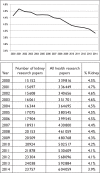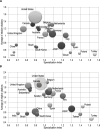The KRESCENT Program (2005-2015): An Evaluation of the State of Kidney Research Training in Canada
- PMID: 28270932
- PMCID: PMC5317037
- DOI: 10.1177/2054358117693354
The KRESCENT Program (2005-2015): An Evaluation of the State of Kidney Research Training in Canada
Abstract
Background: The Kidney Research Scientist Core Education and National Training (KRESCENT) Program was launched in 2005 to enhance kidney research capacity in Canada and foster knowledge translation across the 4 themes of health research.
Objective: To evaluate the impact of KRESCENT on its major objectives and on the careers of trainees after its first 10 years.
Methods: An online survey of trainees (n = 53) who had completed or were enrolled in KRESCENT was conducted in 2015. Information was also obtained from curriculum vitae (CVs). A bibliometric analysis assessed scientific productivity, collaboration, and impact in comparison with unsuccessful applicants to KRESCENT over the same period. The analysis included a comparison of Canadian with international kidney research metrics from 2000 to 2014.
Results: Thirty-nine KRESCENT trainees completed the survey (74%), and 44 trainees (83%) submitted CVs. KRESCENT trainees had a high success rate at obtaining grant funding from the Canadian Institutes of Health Research (CIHR; 79%), and 76% of Post-Doctoral Fellows received academic appointments at the Assistant Professor level within 8 months of completing training. The majority of trainees reported that KRESCENT had contributed significantly to their success in securing CIHR funding (90%), and to the creation of knowledge (93%) and development of new methodologies (50%). Bibliometric analysis revealed a small but steady decline in total international kidney research output from 2000 to 2014, as a percentage of all health research, although overall impact of kidney research in Canada increased from 2000-2005 to 2009-2014 compared with other countries. KRESCENT trainees demonstrated increased productivity, multiauthored papers, impact, and international collaborations after their training, compared with nonfunded applicants.
Conclusions: The KRESCENT Program has fostered kidney research career development and contributed to increased capacity, productivity, and collaboration. To further enhance knowledge creation and translation in kidney research in Canada, programs such as KRESCENT should be sustained via long-term funding partnerships.
Mise en contexte: Le programme KRESCENT (Kidney Research Scientist Core Education and National Training) a été lancé en 2005 pour augmenter la capacité de la recherche sur les maladies du rein à travers le Canada, et pour encourager la transmission des connaissances au sein des quatre axes de recherche en santé.
Objectifs de l’étude: Cette étude avait pour but d’évaluer les répercussions du programme KRESCENT sur ses principaux objectifs ainsi que des retombées sur la carrière des stagiaires participants, dix ans après sa création.
Méthodologie: Un sondage en ligne a été mené en 2015 auprès des stagiaires (n = 53) ayant été admis ou ayant complété le programme KRESCENT. Des renseignements ont également été obtenus par la consultation de curriculum vitae (CV). Une analyse bibliométrique a évalué la productivité scientifique et la collaboration des participants ainsi que les répercussions de leur participation à KRESCENT sur leur carrière. Les données de cette analyse ont été comparées à celles des candidats n’ayant pas été retenus au cours de la même période. L’analyse comprenait également une comparaison des données canadiennes avec celles obtenues en recherche sur les maladies du rein ailleurs dans le monde.
Résultats: Trente-neuf stagiaires du KRESCENT ont complété le sondage en ligne, soit 74% des personnes contactées, et quarante-quatre ont soumis leur CV. De manière générale, les stagiaires du KRESCENT ont obtenu plus facilement des subventions des Instituts de recherche en santé du Canada (IRSC) avec un taux de succès de 79%. De plus, 76% des détenteurs d’une bourse au niveau postdoctoral ont obtenu des charges professorales à titre de professeur adjoint dans les 8 mois suivant leur formation. La très grande majorité des stagiaires (90%) a indiqué que le KRESCENT avait grandement contribué au fait qu’ils aient obtenu les fonds des IRSC, de même qu’à la création de nouveaux savoirs (93% des répondants) et au développement de nouvelles méthodes (50% des répondants). L’analyse bibliométrique a révélé un léger, quoique régulier, déclin de la quantité de résultats en recherche sur les maladies du rein dans le monde entre 2000 et 2014, lorsque converti en pourcentage des résultats totaux en recherche sur la santé. Et ce, bien que l’incidence générale de la recherche sur les maladies du rein ait augmenté au Canada de 2000 à 2005 ainsi qu’entre 2009 et 2014 en comparaison des autres pays. De manière générale, à la suite de leur formation, les stagiaires du KRESCENT ont démontré une plus grande productivité, ont plus souvent participé à la rédaction de publications collectives ou à des collaborations internationales que les demandeurs n’ayant pas reçu de financement.
Conclusion: Le programme KRESCENT a favorisé le perfectionnement professionnel en recherche sur les maladies du rein et a contribué à augmenter la capacité de recherche, la productivité et la collaboration des participants. Ainsi, pour poursuivre la création de nouveaux savoirs en recherche sur les maladies du rein et faciliter leur transmission auprès des chercheurs canadiens, nous sommes d’avis que les programmes de formation tels que le KRESCENT devraient continuer d’être financés sur le long terme par l’entremise de partenariats.
Keywords: allied health; bibliometrics; kidney research; knowledge translation; new investigator; postdoctoral fellow; training.
Conflict of interest statement
Declaration of Conflicting Interests: The author(s) declared no potential conflicts of interest with respect to the research, authorship, and/or publication of this article.
Figures



References
-
- The Kidney Foundation of Canada. National Research Coalition Task Force Report. www.kidney.ca. Published 2002.
-
- Canadian Organ Replacement Register. Treatment of end-stage organ failure in Canada, 2005 to 2014. 2016 Annual Report, Canadian Organ Replacement Register, Canadian Institute of Health Information; www.cihi.ca. Published 2016.
-
- Burns KD, Wolfs W, Bélanger P, McLaughlin K, Levin A. The KRESCENT program: an initiative to match supply and demand for kidney research in Canada. Clin Invest Med. 2010;33:E356-E367. - PubMed
-
- Canadian Institutes of Health Research. Knowledge Translation [KT] within the Research Cycle Chart. Ottawa, Ontario: Canadian Institutes of Health Research; www.cihr.ca. Published 2007.
LinkOut - more resources
Full Text Sources
Other Literature Sources

